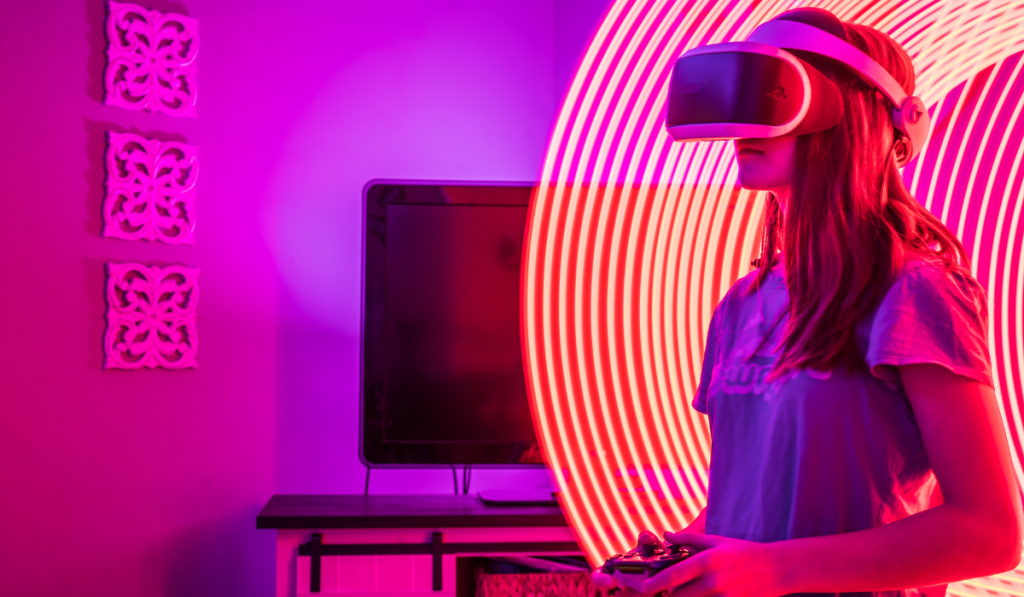Can virtual reality VR have an impact on autism therapy? As technology continues to advance, the potential applications of virtual reality in treating various mental disorders are becoming more apparent.
This blog post will examine how virtual reality technology may be used to help those with autism spectrum disorder (ASD) by looking into the effectiveness of VR-based interventions through a systematic review and meta-analysis, which can potentially lead to improvements in reflective versus intuitive skills. Furthermore, we will discuss how overcoming deficits through virtual reality lessons can lead to significant advancements in ASD-related disabilities.
In addition to these findings, our exploration will cover the use of virtual reality exposure therapy as a means to alleviate phobias commonly experienced by autistic children. Finally, we’ll examine Flanagan Leadership Group’s neurodiverse-friendly coaching sessions that utilize immersive experiences tailored specifically for those on the autistic spectrum.
By understanding these developments and applications within the field of autism therapy, it becomes clear that there is indeed potential for virtual reality to have a major impact on improving outcomes for individuals diagnosed with ASD.
Effectiveness of VR Training for Autism Therapy
For those who doubt the effectiveness of a virtual environment, evidence-based studies have provided compelling proof that it can be a powerful tool for enhancing autism therapy. A recent evidence-based systematic review and meta-analysis (you know, the kind with actual data) examined a number of studies (33 to be exact) on the impact of VR training on individuals diagnosed with autism spectrum disorder.
- Improvement in reflective skills through VR training: The positive results showed that these cutting-edge interventions not only worked but had larger overall effect sizes compared to traditional programs. In other words, autistic individuals are leveling up their reflective skills like never before.
- Comparison between VR and traditional therapy methods: So next time someone tells you that the use of VR technology therapies can’t hold a candle to good ol’ fashioned real world face-to-face therapy sessions, feel free to drop some knowledge bombs about how this immersive virtual reality experience is revolutionizing autism treatment options.
Related: What is Neurodiversity?

Overcoming ASD-related Disabilities with Virtual Reality
Research has shown that individuals with autism spectrum disorder develop mechanisms to overcome their deficits. VR therapies can significantly improve ASD-related disabilities by providing a safe and controlled environment for practicing social interactions and communication skills.
Mechanisms developed by autistic individuals using VR
Autistic patients have the ability to adapt when given the right tools. VR technology can help them develop coping strategies while navigating through daily life challenges.
Improvements in social interaction abilities
VR therapy allows young people to practice their social skills without feeling overwhelmed or anxious. Additionally, this immersive experience can help them level up their social interaction abilities.
Treating Phobias Using Virtual Reality Exposure Therapy
Have you ever wished you could just zap away a feared situation like a superhero? Well, virtual reality is here to save the day. Research findings show that virtual reality exposure therapy can be a game-changer for autistic kids dealing with phobias. So buckle up because we’re diving into the world of VR and how it’s helping kids face their fears.
- Tailored virtual environments for exposure therapy: Imagine creating a personalized fear-fighting arena where autistic children and young adults can confront their anxieties and specific phobias head-on without any real life consequences. And that’s precisely what these nifty little new environments do—help with your child’s fears and special needs.
- Reduction in fear or anxiety levels post-treatment: After just two weeks of treatment using VR exposure therapy, about 25% of participants experienced sweet relief from their phobia-induced stress (cough cough, take that, fear.). This goes to show that incorporating this innovative tool into therapeutic interventions has some serious potential benefits.
No capes needed here – all it takes is a virtual reality headset and some courage.
Related: 4 Ways to Embrace Neurodiversity in the Workplace

Flanagan Leadership Group’s Neurodiverse-Friendly Coaching Sessions
Have you ever felt like a fish out of water in the business world? Well, fear not. The Flanagan Leadership Group has got your back with their oh-so-immersive coaching sessions designed specifically for you neurodiverse geniuses. That’s right – we’re talking about those diagnosed within the autism spectrum range who may benefit greatly from this innovative form of therapeutic intervention.
- Immersive coaching sessions: Forget traditional therapy methods; dive headfirst into our virtual reality (VR) training that’ll have you practicing responses to challenging scenarios in a controlled way and without breaking a sweat or feeling overwhelmed by real-world situations.
- Sensory overload be gone: Our VR technology ensures autistic adults can practice social interactions and communication skills without triggering sensory overload meltdowns common amongst the autistic population. It’s like magic.
Intrigued? You should be. So go ahead and check out how Flanagan Leadership Group is revolutionizing the way we prepare autistic people for success in today’s fast-paced, cutthroat business environment using cutting-edge VR interventions in a safe environment. Trust us, it’ll change your life.
Related: Authenticity in Translation
Conclusion
Overall, virtual reality interventions have demonstrated potential in treating autism spectrum disorder. Recent work on systematic reviews and meta-analyses have demonstrated its effectiveness in improving reflective skills and overcoming deficits associated with ASD-related disabilities. Additionally, exposure therapy using VR has been successful in reducing fear or anxiety among autistic children.
At Flanagan Leadership Group, we offer immersive coaching sessions tailored to neurodiversity that provide benefits and advantages over traditional methods. By utilizing innovative techniques such as virtual reality training, we can help individuals on the spectrum reach their full potential and take full control of the situation they’re faced with.
So, if you’re interested in learning more about how our neurodiverse-friendly coaching sessions can benefit you or a loved one with autism or developmental disorders, please visit flanaganleadership.com and get in touch with our support team.


